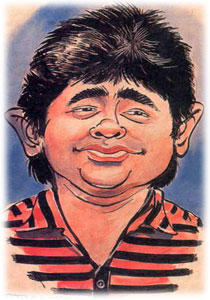Source: Rediff
Dr Suranjan Bhattacharji, director, Christian Medical College, Vellore, Tamil Nadu, which has served India with quality healthcare and education for over a century, says a doctor in a developing country like India has to see himself as an agent of change, not just as a medical practitioner.
"If we see our role as agents of change, then it is much more effective than just having a narrow range of skills of curative services," Dr Bhattacharji said in an interview during a brief visit to New York last month.
Dr Bhattacharji, who was in the United States primarily to attend the CMC's board meeting, felt doctors in countries like India have to be good communicators so they can address society on issues that are most important.
Besides, they have to be good teachers not only of the medical students but of the patients who come to see the doctors, he said.
"Our role is educating him or her [the patient] about the issues that are causing ill health and what are the ways to overcome them. We have to be able to educate the community leaders so that they begin to invest in the things that will improve health," he said.
Dr Bhattacharji, who was appointed to the post recently, said because India was a resource-constrained society, the doctors there have to constantly ask themselves which is the best way to treat the individual within the context in which s/he lives.
"We have to decide what is best for him and not what is the best in the world. Our motto [at CMC] is how the treatment can make him or her better and cure without destroying the family," he said.
"What often happens is that if the person cannot afford treatment, the child is pulled out of school, the land mortgaged and the whole family made economically disadvantaged. We know that one of the causes for ordinary people in developing countries becoming suddenly impoverished is ill health because the cost of health or treatment is so high," Dr Bhattacharji said.
Dr Bhattacharji, who has been associated with the reputed medical college and hospital for close to four decades, cited the example of Dr Binayak Sen, a CMC alumnus who has been jailed by the government of Chhatisgarh for the last year, for his alleged links to Maoist guerrillas.
"We are very proud that he is our graduate. Binayak is a typical example of the kind of graduate we have always worked to produce someone who is not just clinically competent but also compassionate and has an inquiring mind; who asks not just how I can get this person healed but also why he is sick in the first place, and how I can ensure that he does not fall sick again," Dr Bhattacharji said.
"You may be able to cure a person of typhoid but if he goes back to his village and keeps drinking water from a contaminated well, in six months he is likely to get typhoid again," he said.
So, what ails the Indian healthcare system?
Dr Bhattacharji feels that there are multiple issues, including inadequate resources for the job to be done. He said the difficulty in many government colleges is not so much that the processionals do not care, but that professionals are overwhelmed by the number of patients.
"If you have to see 200 patients in three hours, you end up by not helping very many people. It has become a vicious circle and an ineffective healthcare system in which you are not motivated to try harder," he said, adding that India needs to ensure a certain level of education.
"Actually, we can best improve health by improving water supply and sanitation. Sanitation is the most cost effective health intervention, according to research. We tend to think of health as cardiology services, neurology services and all that. Those are very important, but perhaps as a nation what we need to do is to improve our public services so that there is better water, better sanitation, better shelter and, of course, availability of food," he said.
"If those needs are addressed, we will actually become much more effective in improving the health of the community. Ignorance and poverty are two prime determinants of ill health," he said. He explained that ignorance means that sometimes it is erroneously believed that only expensive food is healthy.
"But we actually know that in the Indian context, a lot of health interventions can be very cost effective. Sometimes, they assume that the most expensive antibiotic is the most appropriate, but it is not true. In fact, sometimes, (having) no antibiotic is more effective than (having one). In CMC, we always believed that improving the sanitation, water supply, food and shelter and education would improve the health of the country much more effectively," he said.
